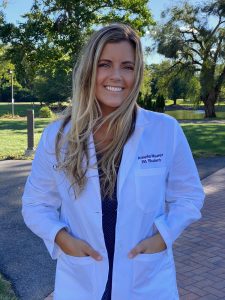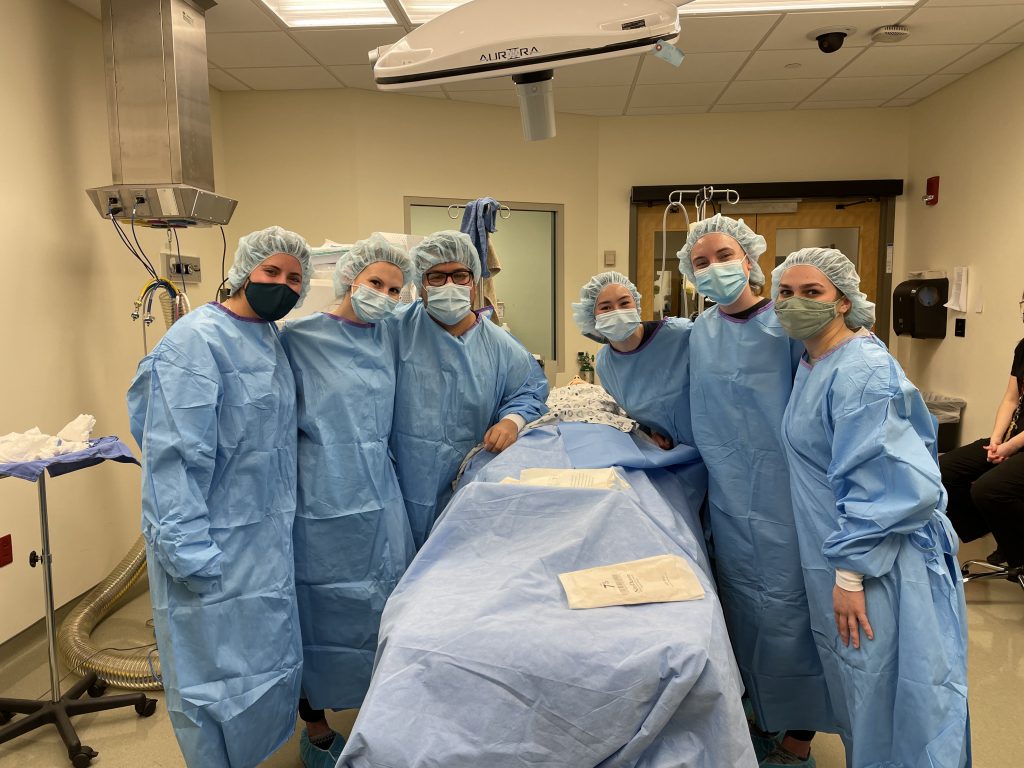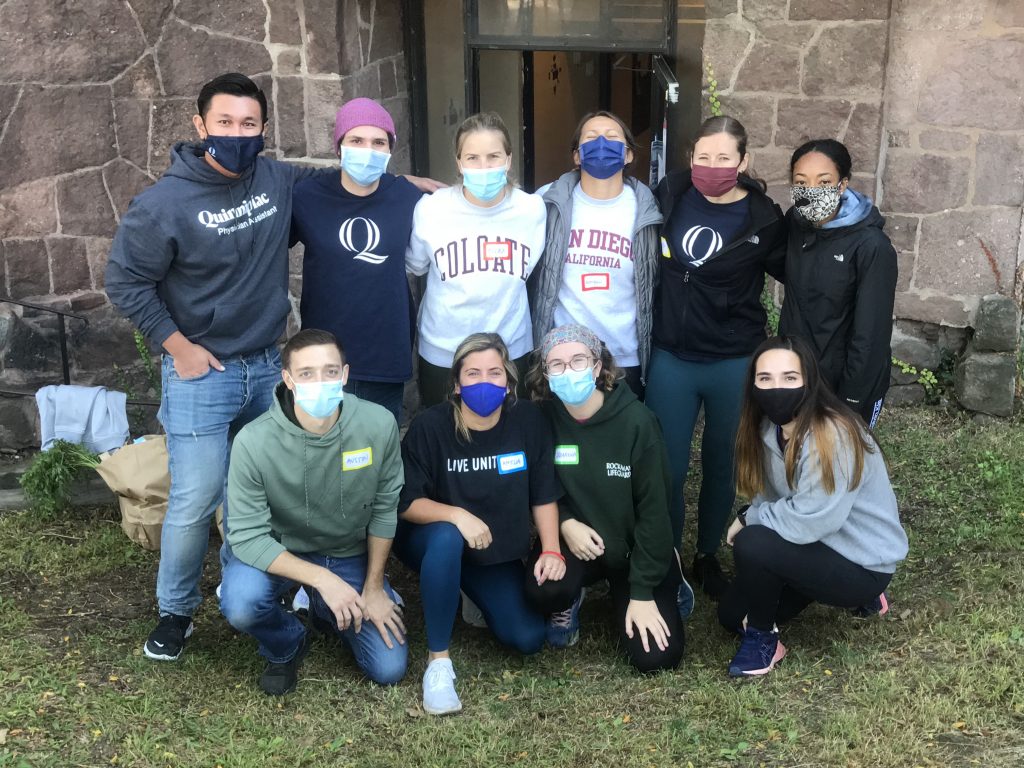Challenges of PA School During COVID-19
Reflections After a Pandemic Year
January 11, 2022
By Amelia Maurer, PA-S

I’ve known I wanted to be involved in medicine since high school. I was aware of the PA profession and its combination of team-based care, autonomy, and flexibility. It was exactly what I was looking for in a career. As an undergrad, I had my sights set on PA school and I didn’t waver in my dedication to get there.
I was a senior in college when I started seriously looking at PA schools. Without formal support, I took it upon myself to research different PA schools around the country – requirements for patient contact hours and shadowing experience, their prerequisite courses, and more. (While doing so, I encountered lots of surprises, and shared my insights.) Once I’d completed my prerequisites – before applying to PA school, which I learned the hard way – I was ready to start the next steps on my road to PA school.
[Grow your network, find a mentor, and more – join or renew your membership today]
Deciding on a PA Program
I cast a wide net when applying to schools. I knew I wanted to attend a school that would support leadership opportunities and had a strong relationship with AAPA. While there are many schools around the country that could have worked, I decided to attend Quinnipiac University in Connecticut. Not only did Quinnipiac have what I was looking for in terms of leadership tracks and a relationship with AAPA, the Quinnipiac PA Program has a cadaver lab and pre-clinical rotations embedded into their program. The pre-clinical rotations are done during didactic year and expose students to the clinical experience prior to clinical year. Both of these opportunities contributed to me ultimately attending Quinnipiac.
I committed to Quinnipiac in September 2019 and was all set to start in-person classes in May of 2020.
As I prepared for PA school, I worked in a dermatology office in Washington, D.C. I was just weeks away from leaving for Connecticut when it became clear that COVID-19 was going to impact my work and school plans – offices were closing, surgeries were cancelled, travel was restricted. I had no idea how the next few months of my life were going to look.
[More from Amelia: On My Way to PA School: Surprises I Encountered]
Starting PA School Remotely
Two weeks before we were due on campus, Quinnipiac notified us that classes were going to be conducted remotely for the time being. The faculty held a Zoom session to inform us about all of the changes that they knew about, and those they were anticipating. No one had any experience with something like COVID-19, so it was new to everyone – PA students, faculty, university administrators. Communication was vital during this time.
I’ll admit that I experienced some disappointment. When we first found out our classes were going to be all online with only some labs in-person, I did feel I was going to be missing out on the full PA school experience. This education was one I had worked towards for years and the thought of not being able to participate in the cadaver lab or in-class discussions was hard to accept.
There was definitely an adjustment period when we started online learning only. In the beginning, the most difficult aspect of online learning for me was doing 8-10 hours of class from the comfort of my own home. In undergrad, I was always able to separate home from schoolwork. I really missed having a library to go to and study! I had to teach myself how to stay motivated while at home. As the semester progressed, I felt more comfortable. I kept to a schedule and started to appreciate the fact that I did not have to commute to campus or plan meals for my day. While these are small details, they did not go unnoticed.
As the first semester progressed, we settled into our routines. My classmates and I would safely meet at each other’s apartments or an outside coffee shop to study together. The biggest challenge for me personally was anatomy lab – online simulations are not the same as spending hours in the cadaver lab! But as more weeks passed, we started to get good news. We were going to be able to come on to campus for certain experiences such as the cadaver lab, phlebotomy, urine analysis, blood typing, and more. I will never take being on campus for granted again!
[PA Students Participate in Community Service During Pandemic]

Returning to In-Person Classes
The Quinnipiac PA Program started conducting in-person classes last fall. Students and faculty had to have two negative COVID-19 tests before our first day back on campus, and random testing was conducted throughout the semester to maintain safety protocols. Since then, I have been on campus one or two times a week for labs, learning how to conduct a physical and patient interviews.
Currently, I am now in my third semester of didactic year. Some classes are in-person and some are online. This has been extremely beneficial as it breaks up the week and gives us an opportunity to practice hands-on skills and interact with our classmates. We are also participating in our pre-clinical rotations. We are placed at a pre-clinical site for three hours a week for five weeks and have the opportunity to practice the history, physical, and oral report to our preceptor.
In addition to my PA school responsibilities, I’ve been volunteering as I’ve been able. COVID-19 did affect some volunteer opportunities, but I was able to work with Loaves and Fishes in New Haven, Connecticut last fall. The program packages fresh groceries and distributes food and clothing to the community. More recently, I have been able to help in the nationwide vaccination campaign. I have had the wonderful opportunity to administer the vaccine at St. Francis Hospital. It has been an incredible experience and I finally feel like I am able to do something and interact with patients.
[PA Caregivers Face Additional Anxiety, Stress During Pandemic]

Lasting Impacts of COVID-19
At first I thought I was going to miss out on a lot of PA school experiences because of COVID-19. But I think the pandemic has almost been a blessing in disguise in terms of my education. I learned how to better manage my time, found new ways to study and stay focused during class, and was attentive to my mental health. I’ve learned a lot about myself.
I think the pandemic will affect me, other healthcare providers, and our patients in ways we don’t even understand yet. We’ve all had different experiences this past year, and I think it is going to impact the way we both provide and receive healthcare for some time to come. I do think the pandemic has made it obvious that PAs are an integral part of the nation’s healthcare system. I can’t wait to start practicing.
Amelia Maurer is a second-year PA student at Quinnipiac University in Hamden, Connecticut. She will graduate in August 2022 and hopes to practice in orthopedics. She can be reached at [email protected].
Editor’s note: This article originally appeared in June 2021.
You May Also Like
AAPA Student Membership
On My Way to PA School: Surprises I Encountered
PA Caregivers Face Additional Anxiety, Stress During Pandemic
PA Students Participate in Community Service During Pandemic
Thank you for reading AAPA’s News Central
You have 2 articles left this month. Create a free account to read more stories, or become a member for more access to exclusive benefits! Already have an account? Log in.



